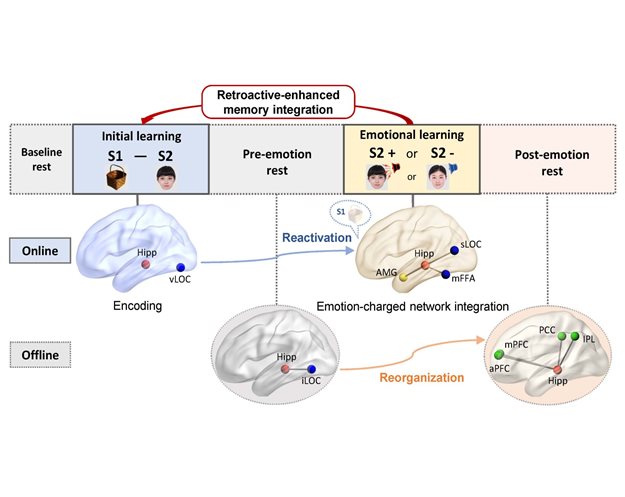
Mundane events are better remembered if they subsequently link to an emotional event. Memories for related experiences are integrated into a highly adaptive brain network. Based on this memory integration, emotions can spread value and significance to related experiences occurring separately in time. However, it remains unclear how emotional learning reshapes our memory guiding future use.
PhD candidate Yannan Zhu and colleagues investigated the neurobiological mechanisms underlying emotionally-charged retroactive enhancement on episode-unique memory integration in humans. The research group, led by Shaozheng Qin from State Key Laboratory of Cognitive Neuroscience and Learning & IDG/McGovern Institute for Brain Research at Beijing Normal University, in collaboration with the research group led by Guillén Fernández at Radboudumc and Donders Institute, published the results in eLife on 8 December 2022.
By two behavioral studies and one functional brain imaging study with an adapted preconditioning paradigm, they show rapid neural reactivation and connectivity reconfigurations underlying the emotionally charged retroactive memory enhancement. Specifically, this study demonstrates that emotional learning can promote memory integration for preceding neutral events through an emotion-modulated rapid reorganization. This reorganization is characterized by increased trial-specific reactivation of overlapping neural traces, strengthened hippocampal-neocortical coupling modulated by the amygdala during emotional learning, and a shift of hippocampal-neocortical connectivity from local stimulus-sensitive neocortex to distributed transmodal prefrontal and parietal areas during post-learning rests.

Now, they have already set up more detailed studies to research the emotional modulation of memory integration, considering different valences and consolidation process. They hope that this line of research can advance our understanding of some mental disorders, such as posttraumatic stress disorder (PTSD) and phobia, leading eventually to novel treatments and interventions.
Publication
Zhu, Y., Zeng, Y., Ren, J., Zhang, L., Chen, C., Fernandez, G., & Qin, S. (2022). Emotional learning retroactively promotes memory integration through rapid neural reactivation and reorganization. eLife, 11, e60190.
Related news items

Call for proposals: research projects for Lowlands Science 2026
17 February 2026Attention researchers: Lowlands Science is once again looking for research proposals for 2026. Read all about the open call here.
go to page

